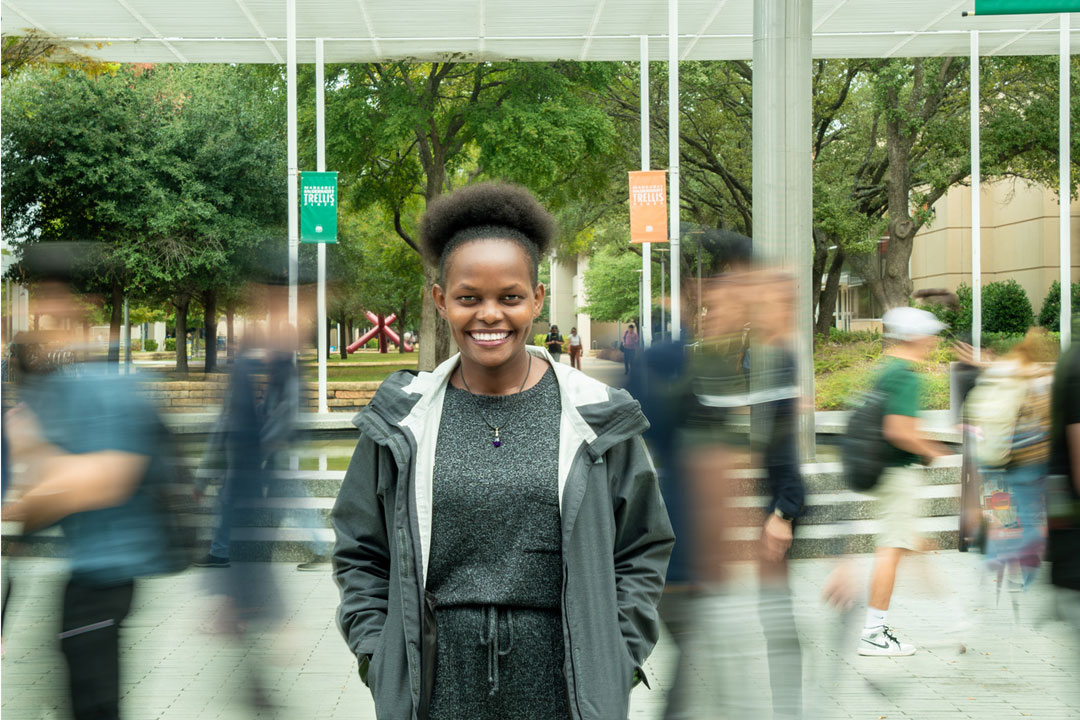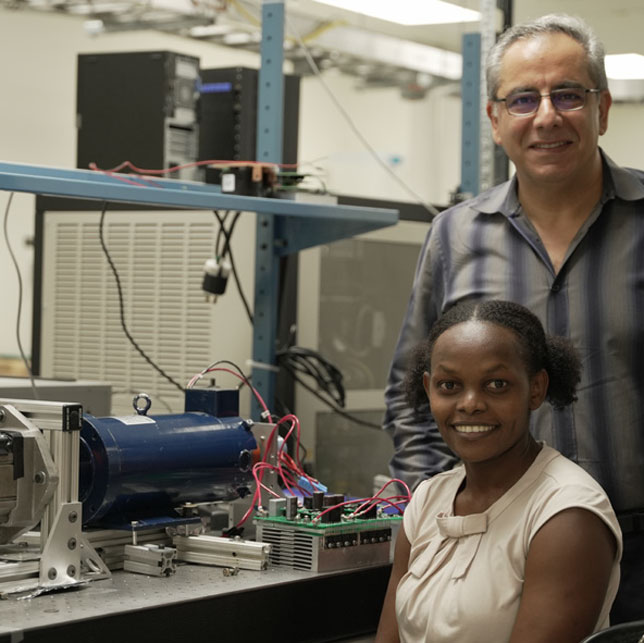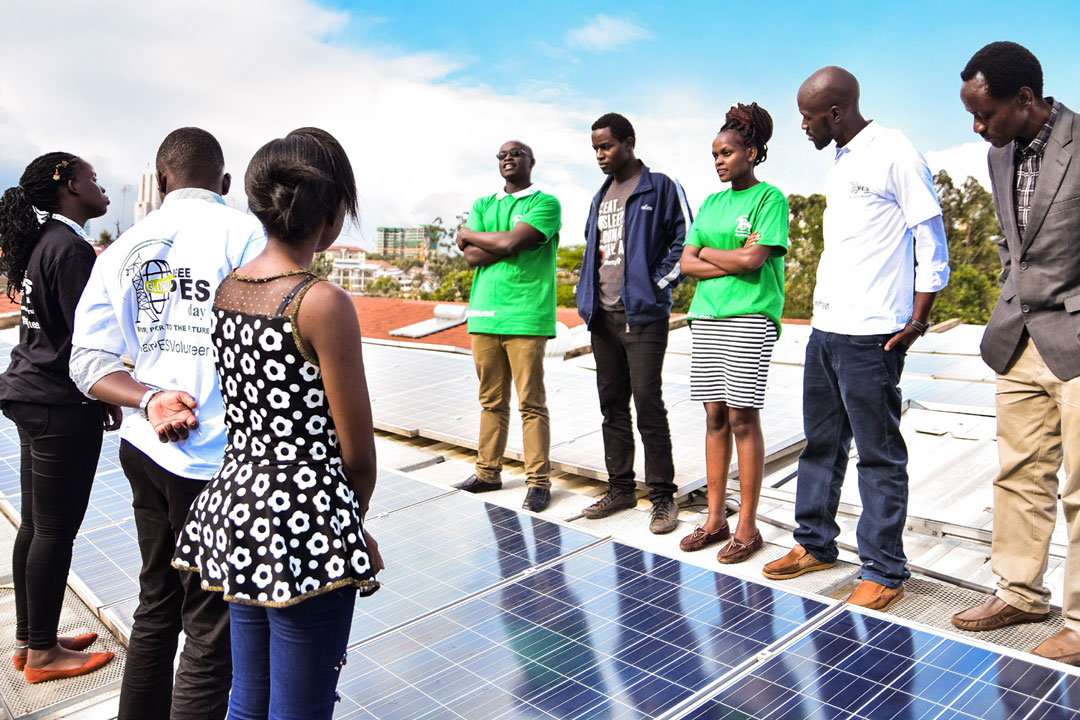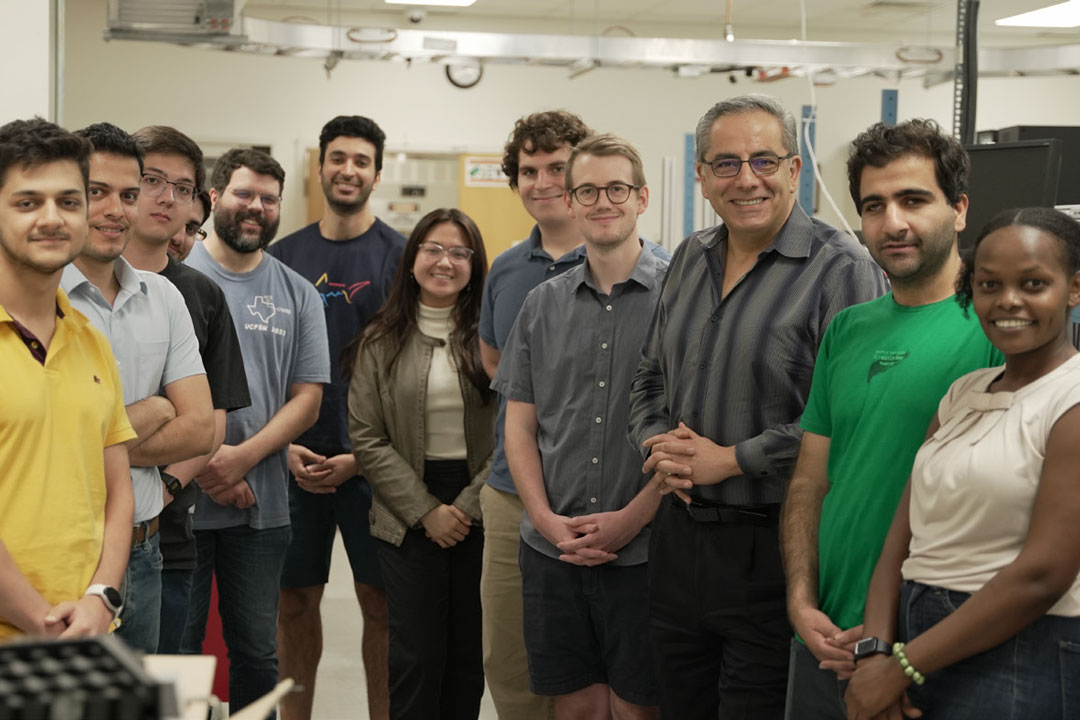Q&A with Mercy Chelangat Koech
Mercy Chelangat Koech, an electrical engineer from Kenya, has relocated to The University of Texas at Dallas to pursue a PhD in electrical engineering in the Erik Jonsson School of Engineering and Computer Science. Driven by her humanitarian spirit, Koech has started her career by focusing on serving populations living with limited access to electricity and is aiming to do even more as she studies sustainable energy and electric transportation at the Renewable Energy and Vehicular Technology (REVT) Lab led by Dr. Babak Fahimi, professor of electrical and computer engineering in the Jonsson School and Distinguished Chair in Engineering at UT Dallas.
“My spouse Dr. Morgan Kiani, professor of electrical engineering at Texas Christian University, met Mercy at a conference and introduced me to her,” Fahimi said. “I noted a significant overlap in terms of our technical interests, humanitarian goals and research activities. Her area of research is focused on the sustainability of an electrified automotive industry, and I am thrilled to see her results. At UT Dallas, Mercy is reinforcing her academic strength and already producing impressive, transformative research outcomes to become a leader in her field of expertise.”
Koech shares more about her commitment to developing innovative solutions, what reminds her of home and how she stays focused as she ramps up her PhD studies.

Mercy Koech, international electrical engineering PhD student, enjoys spending time at the Plinth, a gathering spot located near the University’s Eugene McDermott Library, Margaret McDermott Trellis Plaza and the Student Union.
Tell me about yourself. I understand you are an international student from Kenya, and that you started your PhD in electrical engineering at UT Dallas in spring of 2023.
I began my journey with an undergraduate degree in electrical engineering from Moi University in Kenya. Upon graduation, I went to industry where my passion for bringing electricity to underserved communities ignited. During the feasibility studies conducted, I learned that over 60% of Africa’s population lives without electricity. Building the necessary infrastructure proved to be a formidable challenge, as there was no return on investment for the energy provider.
Eager to make a difference, I joined a solar startup, collaborating with industrial, health care and educational institutions. However, it was through my involvement with the Institute of Electrical and Electronics Engineers (IEEE) as a volunteer that my horizons expanded exponentially, immersing me in a vibrant community of like-minded individuals. With the research amassed over the past five years, I felt it was important to consider graduate school to share and publish perspectives from different parts of the world.
I had heard of many stories from friends about international student life but experiencing it firsthand has been surreal. I felt like my entire life was fitted into three suitcases. My REVT Lab mates come from different parts of the world, yet we find common ground in our shared love for pickles, egg omelets, cookies, tea and coffee. Chapati — a soft bread like naan — was embraced as an integral part of the Kenyan cuisine from Indian immigrants involved in the construction of the Kenya–Uganda Railway.
So far, I have enjoyed the beauty of the campus — my favorite place is the Plinth. Intercultural Programs (ICP) has enriched our experience with memorable trips such as the Texas Rangers vs. Detroit Tigers baseball game as well as the “Moulin Rouge” musical, which helped us learn more about American culture. I have also visited the Dallas Zoo which reminded me of the African savannah back home.

Mercy Koech (left) made the decision to relocate to Texas and begin her PhD program after she found common ground with Dr. Babak Fahimi (right).

Koech (third from right) worked with the Institute of Electrical and Electronics Engineers (IEEE)’s Power Engineering Society (PES) in rural Kenya to install sustainable microgrids and solar arrays that power farms. Engineers in Kenya focus on educating the whole community toward adopting new technology.
Working with the IEEE Smart Village (ISV) program that combines renewable energy, community-based education and entrepreneurial opportunities in a developing world reignited my passion for engineering. I wanted to see the overall impact of the projects I was involved in, particularly how they benefited the community. Through IEEE, I not only built a global network but also found a deeper connection to the far-reaching influence of my work. I was also motivated to make more impact in off-grid communities.
How is your experience working with Dr. Fahimi, director of the REVT Lab?
Working with Dr. Fahimi has been an incredibly enriching experience, as he has a unique ability to ignite one’s passion. His guidance as an advisor has been highly beneficial for my personal and professional growth during these past few months. Dr. Fahimi has a genuine concern for his students’ overall well-being and his willingness to share invaluable insights. I approach each day with an open mind thereby, embracing a continuous learning mindset.
Education here is more practical. I have always been interested in the technical side of how technological infrastructure systems are created. The beauty of being here is learning how the devices used to drive industrial machines and consumer electronics are developed, tested and certified for different applications.
Two years ago, you were recognized by IEEE as a Smart Village Ambassador and a Women in Power Society leader. You are also now serving as a governing board member at large representative on climate change and served with the Power & Energy Society. How has this organization impacted your career development?
After two years of working in industry, I took a few months’ break to rethink my career direction. The break provided me with an opportunity to be more involved with IEEE, a global engineering organization offering extensive networks and support for students and young professionals. I faced many challenges as a female engineer. Through IEEE, I sought insight from senior members while at the same time mentoring young engineers who aspired to follow the path.
Given IEEE’s global presence in over 190 countries, I was eager to connect and expand my knowledge base. As I became more involved, I proactively promoted our projects and established connections through video interactions. I made it my goal to connect with three new people a day. To date, I have worked with volunteers from over 50 countries.
You have previously served a number of organizations including The Maa Trust, an organization dedicated to supporting the Maasai ethnic group, and the Tech-Gaa Hub, a women’s group that teaches tech literacy in Kenya. What are some challenges individuals face in rural communities like those in East Africa?
People living without access to electricity encounter numerous challenges, with education being the foremost concern. Our aim is to integrate technology in the communities without compromising their cultural lifestyles. The Maasai are an indigenous tribe that have historically lived as pastoralists at the heart of the famous tourist destination Maasai Mara National Reserve. I lived with them in a tent working with IEEE Smart Village to understand the community’s energy-related needs.
In many developing countries, people own communication devices such as mobile phones but lack access to charging stations. Another key aspect is health care, where people are forced to travel far to find a hospital or clinic. With solar-powered health centers, medicines can be refrigerated, and medical devices can operate reliably without interruption to provide the necessary life support operations.

The REVT Lab includes (left to right): Ahmad Nabizadah, Behnam Mosammam, Ethan Winchell, Kevin Matthew Largent, Dustin Pundt, Vahid Rafiei, Allison Lane Pham, Aaron Brown, Thor Westergaard, Dr. Babak Fahimi, Majid Ghasemi Korrani and Mercy Koech. The lab is home to graduate and undergraduate researchers from across the globe who are working on a broad range of projects related to renewable energy and sustainable development.
These technologies not only contribute to addressing climate change by reducing carbon emissions but also uplift the living standards of off-grid communities, enhancing their overall well-being, resilience and sustainable development. With communities reducing reliance on fossil fuels, their health improves, and they can use solar to power productive appliances such as water pumps, fans, fridges, irrigation systems, cold storage, flour millers, all of which are essential for daily life.
While many solar systems are currently imported, I hope that more localized solutions will be produced so more people are educated on the importance of these technologies. With increasing electronic waste production, I hope that more recycling solutions will be considered.
In some communities in Kenya, land is communally owned. Through ISV, I was engaged with Bright Hope International, a nongovernmental organization (NGO) based in Illinois to implement a solar-powered water pump that provided water for one farm’s drip irrigation, engaging 100 farmers and serving over 2,000 people who benefit from the water for their basic needs. In this context, following the success of the project, the community members offered an additional five acres of land to expand the project. Women also no longer have to travel far to fetch water.
I have noticed that one connection will often lead to another. These well-knit cultures still exist. Educating people is a key component — the little inputs can often have the most impact.
I just arrived in January, but I have to say I am impressed the team members of IEEE UT Dallas, some of whom also work in Dr. Fahimi’s lab. They offer several educational training seminars, workshops, tutoring sessions and partner with companies such as Murata Manufacturing, Texas Instruments and Intertek to promote professional development. It is cool to see the networking taking place at UTD.
I aspire to complete my PhD and get a fulfilling job that will allow me to bring impactful technology back to my home country. I am inclined to serve the communities that have the most need.
With the right skills and partnerships, I hope to start an NGO that will provide solar energy to power productive applications in various communities that solve the challenges they are facing. It will not be easy to make this change — it’s going to take partnerships with a lot of people and organizations.
It’s an honor being here. I am grateful to the UT Dallas community for providing us with the resources to continue our education, make our dreams come true and be hopeful about the future.
Discover More
RACING TO THE TOP
In 2020, at the height of the pandemic, The University of Texas at Dallas added track and field to the existing cross country team, firing the starter’s gun on a program racing to the top of the American Southwest Conference (ASC). Two of the most decorated members of...
CHARGED UP for Battery Research
Collaboration Leads to New Center, University’s Largest Grant As electric vehicles and renewable energy sources including solar and wind are scaling production, researchers across the globe are racing to develop a critical system component —...
BUILDING A BETTER DESIGN COURSE
BUILDING A BETTER BIOENGINEERING DESIGN COURSE: PREPARES STUDENTS FOR CAPSTONE
UTD TECHNOLOGY EXPERTS SEPARATE CHATGPT
FACT FROM FICTION AT COMMUNITY FORUM Science reporter Adithi Ramakrishnan of The Dallas Morning News moderated the forum.University of Texas at Dallas technology experts dispelled misconceptions and highlighted advantages of a new artificial intelligence (AI) tool...
SERVICE AT SCALE
SERVICE AT SCALE
Collective Data, Individual Health
Distinguished Lecturer Discusses Expanding Genomics to PhenomicsFragments of data about our health are collected continuously by our watches and smartphones and then transmitted to our electronic health records. How can these loose data points translate into meaningful, long-term health solutions?...
